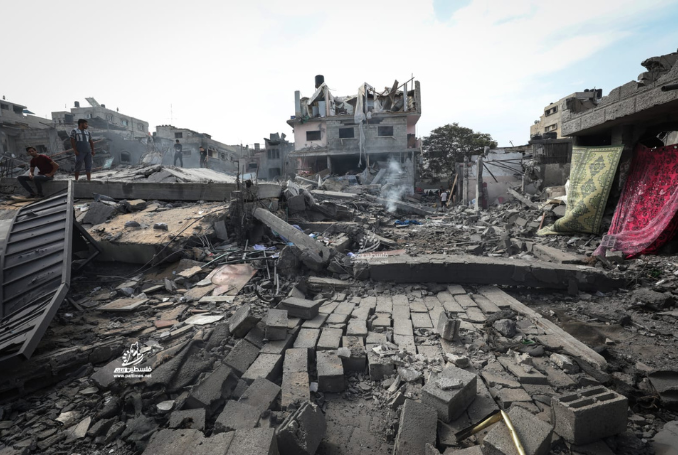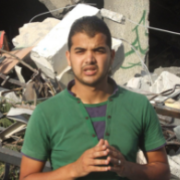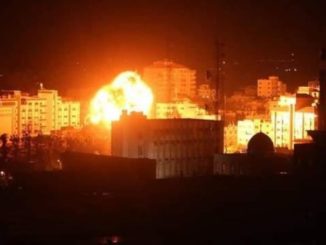
For about 40 hours, residents of the Gaza Strip were cut off from the rest of the world as Israeli occupation forces severed internet and communication networks throughout the entire Strip.
The Palestinian Ministry of Health issued a distress call to all the free people of the world, urging them to intervene and restore internet and communications networks.
Emergency response crews and civil defense teams were heavily reliant on these networks to respond to rescue and recover those killed and injured by Israeli missile strikes.
Mohammed al-Hajj is the communications director at Al-Aqsa Martyr’s Hospital in Deir Al-Balah. In an interview with the Palestine Chronicle, Al-Hajj said, “The 40-hour cut in services by the Israeli government resulted in the unnecessary deaths of many wounded.”
“We no longer know what is happening in the Gaza Strip. We rely on the ambulance teams for directions to the strike locations, and we redirect ambulance and civil defense vehicles accordingly,” al-Hajj added.
Al-Hajj told the Palestine Chronicle that the blackout “put citizens’ lives at risk and resulted in the loss of many lives due to the delay in the arrival of ambulance and civil defense teams.”
Jacob Hamad, a volunteer who is assisting in treating the wounded at the Return Hospital in the Nuseirat Refugee Camp, said that Gaza endured two harsh, dark nights. Experiencing heavy bombardment, the Strip was isolated from the rest of the world.
“Israeli occupation forces struck Gaza intensely during the past two nights, with the most firepower since the beginning of the Israeli aggression on Gaza,” Hamad said in an interview with The Palestine Chronicle, adding,
“We were waiting for the arrival of the first wounded person to the Return Hospital in civilian vehicles so we could ask about the location of the airstrikes. We would then mobilize ambulance and civil defense vehicles to the scene. This takes longer and results in the deaths of many wounded.”
“The arrival of the wounded in civilian vehicles to the hospital and their movement during airstrikes endangers their lives. But there is no alternative to transporting them in civilian vehicles, which only adds even greater risk and suffering for all the residents of the Gaza Strip,” Hamad told us.
Who were the targets? Who died?
Another Gaza resident, Mahmoud Haroun, told The Palestine Chronicle that Israeli forces targeted the entire residential area of the Nuseirat Refugee Camp killing more than 15 Palestinians and injuring dozens.
Haroun explained that it was impossible to communicate with emergency services, and they didn’t arrive at the scene until nearly a half an hour later.
“Dozens of young people from the neighborhood, whom God saved from injury during the shelling, volunteered to evacuate the wounded and the martyrs,” Haroun said.
“But the rescue efforts were very weak, and we relied on the fires caused by the missiles for visibility because there has been no electricity in Gaza for more than 20 days.”
“The cries of the children and the wounded at the bombing site were many, and what saddened us the most was our feeling of helplessness in alleviating their suffering. We have no medical equipment, and we can’t alleviate their pain,” Haroun lamented, adding,
“Our work was limited to moving the wounded from the bombing site until the ambulances arrived.”
Abdul Rahman Khaled, a young resident of the Nuseirat Refugee Camp, told The Palestine Chronicle that his good friend, Anas, was killed in an Israeli shelling of a residential apartment in the camp after midnight on Saturday.
He didn’t find out about his friend’s martyrdom until a day after the Israeli bombing.
Khaled told The Palestine Chronicle,
“My friend Anas and all members of his family were buried, and I didn’t know that he had been martyred, or that his house was targeted by Israeli shelling, because there was no communication and internet for almost two days in all of Gaza.”
Communications have been restored now, giving the survivors time, amidst the falling bombs, to rescue their wounded and bury their martyrs.
(The Palestine Chronicle)

– Abdallah Aljamal is a Gaza-based journalist. He is a contributor for The Palestine Chronicle from the Gaza Strip. His email is abdallahaljamal1987@gmail.com







